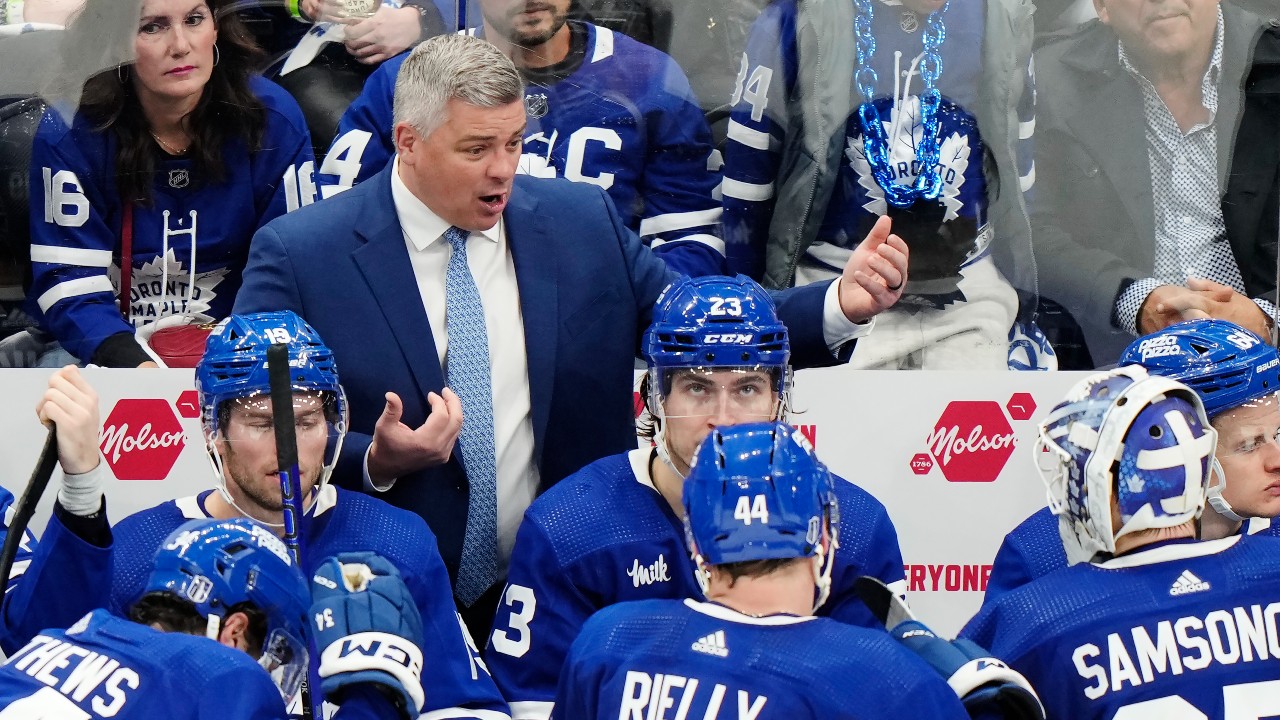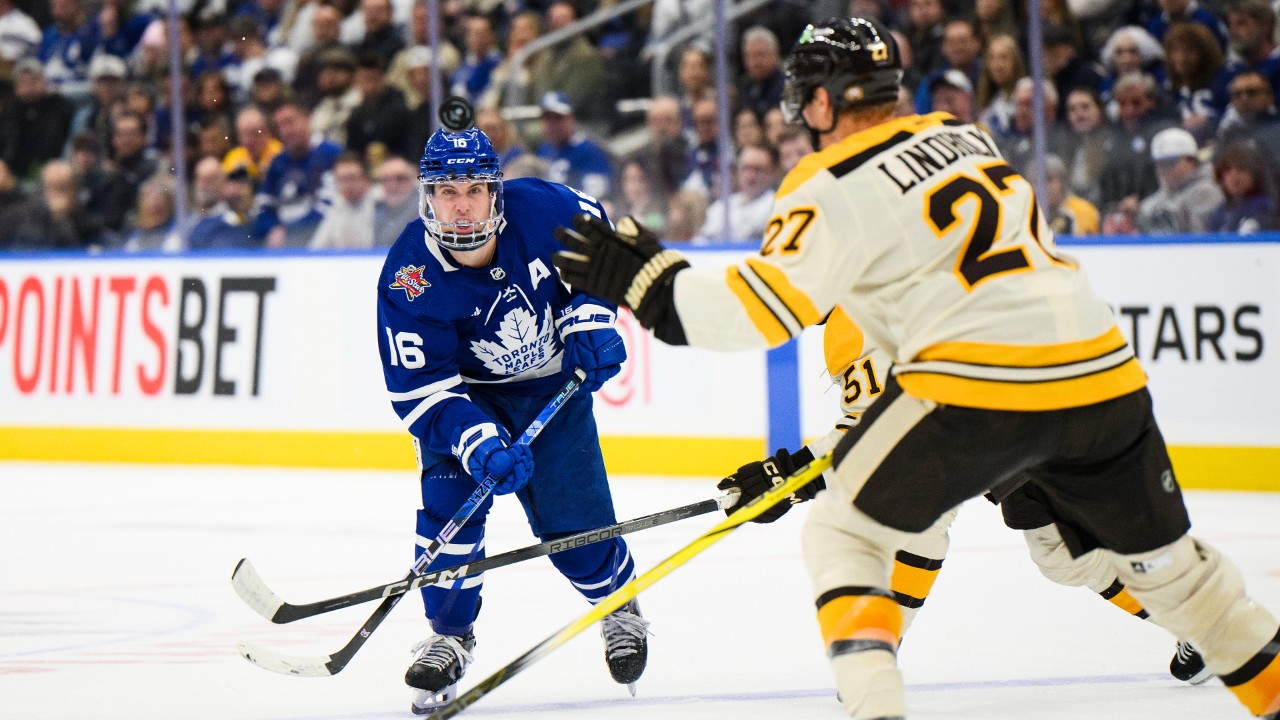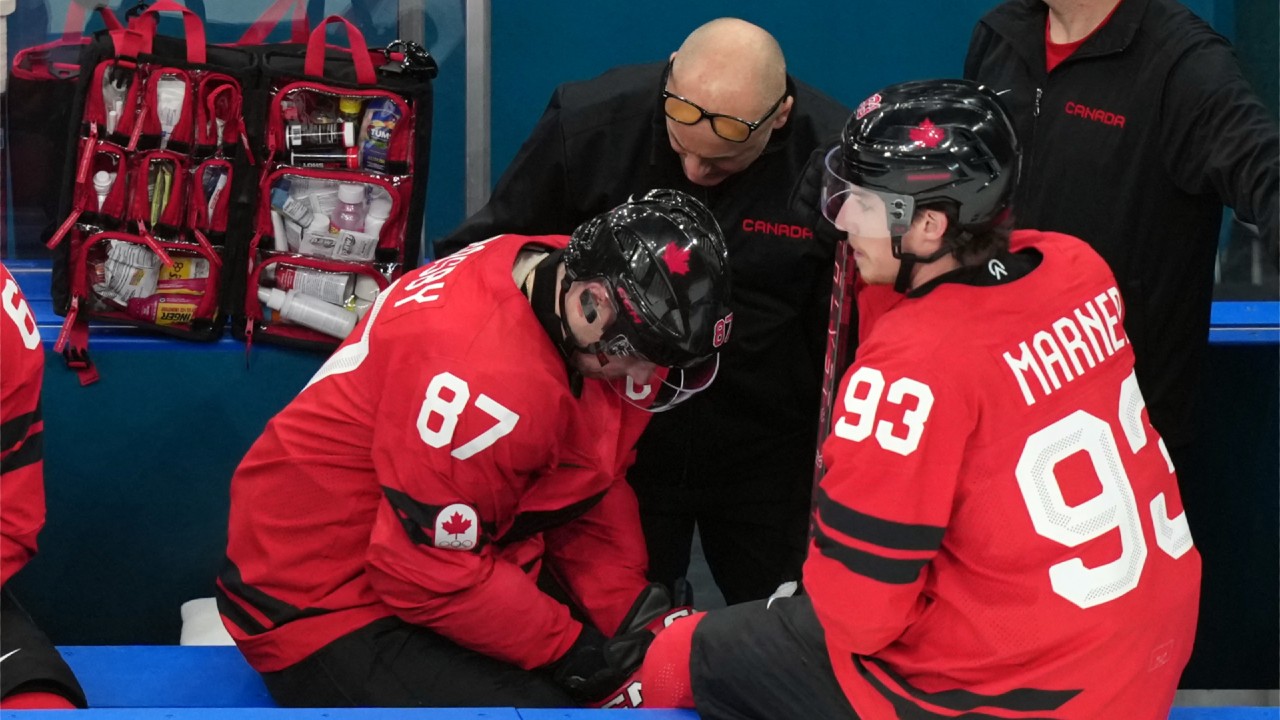
TORONTO — Wearing the sweat of an effort that wound up wasted, and a disappointment that feels all too familiar, the Toronto Maple Leafs stood in their locker room late Wednesday night looking deflated.
The thrill of that resilient Game 2 victory all but evaporated, they sighed, and turned their attention to dissecting where and why Game 3 got away from them. They spoke of momentum, of being unable to ride the swings as well as they could’ve. They spoke of starting slow, playing catch-up, failing to find their rhythm.
Assessing how to get his club’s offence back on track after a night that saw the Leafs unable to muster more than two goals for the ninth time in 10 post-season games, head coach Sheldon Keefe was more pointed.
“The power play’s a big part of it,” Keefe said once the final buzzer sounded on a 4-2 loss that gave the Boston Bruins a 2-1 series advantage. “You know, we get to two [goals]tonight. The power play needs to get you one, to get you to three, if not four. And then it’s a good night offensively in the playoffs, against an elite defensive team like they are, in the type of game that it is.
“It’s a big part of it. Our power play’s got to find ways to get one.”
Five times Wednesday night, the Maple Leafs’ top power-play unit hopped over the boards, gifted a chance to bear down on the visiting Bruins with an extra man on the ice. And five times, the advantage expired with the score unchanged.
But it wasn’t just the goose egg that hurt these Leafs in this one. It was how exactly those missed opportunities fell on the timeline of this loss, how it might wind up falling on the timeline of this series, when all is said and done.
It took less than a minute in Game 3 for special teams to become a crucial part of this night. Forty seconds into the tilt, an errant puck flipped over the glass sent the Maple Leafs to an early penalty kill, the crowd groaning at the first scenes of a movie they’ve seen too many times before.
But the Leafs survived, and a few minutes later, got an early chance of their own. They couldn’t capitalize. Later in the period, a tightly contested frame that saw neither team able to break the deadlock, Toronto got another chance on the advantage. Again, they couldn’t capitalize.
Seven minutes into the second period, there came another chance. In the final minute of the second period, with the score now knotted at 1-1, there came another. Again, both times, the advantage went up in smoke.
The Bruins, meanwhile, found themselves with a power play of their own to start the third. And having fallen short earlier in the night, they made no mistake when the opportunity was in front of them again — a hard-fought battle along the wall in the Leafs’ zone ended with the puck on Brad Marchand’s stick, a shot on Ilya Samsonov, a rebound buried by Jake DeBrusk, and a 2-1 Bruins lead.
Three minutes later, the Maple Leafs got their fifth power play of the night. And while the home side launched all they could at Jeremy Swayman, twice coming within an inch of scoring, the advantage, yet again, expired with the score unchanged.
The clubs traded goals in the third before Boston sealed the 4-2 win with a late empty-netter — on the power play.
Asked late Wednesday what needs to change to allow their own special-teams unit to begin cashing in on some of their chances moving forward, the blue-and-white’s leaders could only shake their heads.
“I think we’re doing an OK job. The puck’s not going in, which is frustrating,” a dejected Morgan Rielly said of the man-advantage. “But there are chances coming. We’re trying to focus on our structure. I think our entries have been good, we’re trying to get pucks to the net, create rebounds and traffic.
“Obviously, it’s all about results, but there’s stuff going on around there. That’s good. It’s just a matter of getting the puck across the line.”
His fellow top-unit facilitator echoed the sentiment.
“I mean, we’re getting our looks. I think we really are,” said Mitch Marner. “I think we’ve done a pretty good job of entering. It’s just being confident in it, knowing that we have the people in here to make it successful. We’re talking, trying to make it better, trying to just relieve pressure a little better, support each other a little better. That’s what we’ll do over these next few days — we’ll figure out how we can be better.”
The pair are right in doling out praise to one aspect of their power-play effort. Per data from Sportlogiq, Toronto had 10 successful man-advantage zone entries on 11 attempts in Game 3. They did some good things once they were in there, too, coming up with six slot shots on the power play, along with nine scoring chances off the cycle, and another off the rush.
Still, as No. 44 made clear, it all comes down to results. And the fact is the Maple Leafs entered these playoffs with the seventh-best power play in the league, and currently have the fourth-worst in the playoffs, having scored just one man-advantage goal on a league-leading 11 opportunities.
“I thought our power play was alright tonight,” Keefe assessed from the bowels of Scotiabank Arena, the loss in the books. “You know, had some good looks in tight around the net that we didn’t make good on. But we’ve got to find a way to get those in. And then at the same time, obviously, we need the kill.
“So, special teams, again, a major factor in the game tonight.”
There is, of course, a key absence among the club’s power-play group. And Toronto’s lack of 5-on-4 success through these three post-season games should make clear just how important that missing piece is.
No Maple Leaf amassed more power-play time in 2023-24 than William Nylander. Only one other Leaf collected more power-play goals than the 11 Nylander potted in the regular season (Auston Matthews’ 18), and only one teammate amassed more power-play shots than the 85 Nylander slung on net (John Tavares’ 87). Perhaps most importantly, no Leaf facilitated on the man-advantage more this season, Nylander’s 24 power-play assists pacing the club.
The sooner Toronto gets No. 88 back in the lineup, the sooner the team’s power-play woes will begin to turn.
Until then, they can look to the club across the sheet for inspiration on how to right the ship, the Bruins having seen their own man-advantage unit go cold down the home stretch of the regular season, only to see it come alive against these Leafs — to the tune of a league-leading five power-play goals through three games.
“We didn’t have it late in the year, and at times it was very frustrating,” Bruins defender Charlie McAvoy said of that late-season slide. “But I don’t think any of us ever lost confidence. We shook up the units a little bit, and if anything, that gave us all a bit of a fresh start and a chance to build some new chemistry.”
It also freed up the decision-making on both units, his coach Jim Montgomery added, broke players out of the habit of simply deferring to offensive leaders Marchand and David Pastrnak.
“Something that I had a lot of confidence in, and I’ve seen in years past,” continued McAvoy, “is regardless of where our power play is, it’s just absolute trust in the guys we have.
“You know, when we need it, we’re able to go and get it.”
For McAvoy’s opponents, this is the central task at hand. There’s no question these Maple Leafs need it — now it’s their turn to prove they can go and get it.
Saturday night, under the Scotiabank Arena lights, they’ll have their next chance.







